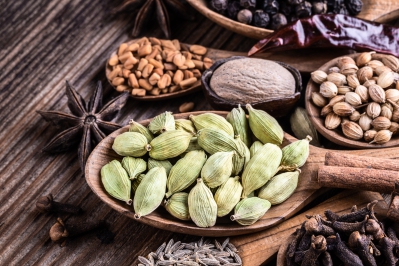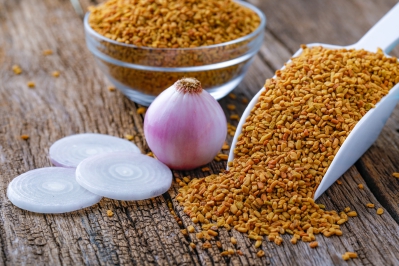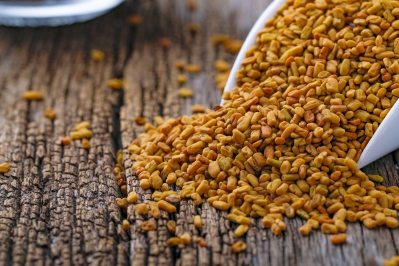Fenugreek is an important herb which is traditionally used as an effective remedial action for several health hazards. Individual basically uses the seeds, twig, leaves and roots of fenugreek, among which consumption of fenugreek seed is healthier. Fenugreek seeds are black in color and have an astringent flavor. It is widely used to treat metabolic syndromes and chronic diseases and used as a potent flavoring agent. It is basically taken by mouth in dry, extracted or powdered form mainly to facilitate weight loss and to prevent diabetes.
Nutritional composition
- Fenugreek seed contains carbohydrates (especially complex carbohydrate), proteins and fats (especially unsaturated fatty acid)
- Fenugreek seed is rich in both soluble and insoluble fibres
- It contains inositol (a carbocyclic sugar), which is associated with improving mental condition such as anxiety, depression, panic, compulsive disorders and helps to prevent PCOS
- It is composed of several vitamins that include Vitamin A, Vitamin D, and Vitamin B complex
- It contains choline which helps to synthesize lipid and their transportation in body
- The minerals present in fenugreek seeds include calcium, phosphorus, iron, copper and magnesium
Biological property
- Fenugreek seed has antioxidant property, antimicrobial property and anti-inflammatory property
- Flavonoid content of fenugreek seed is responsible for its antioxidant activity and helps to reduce the prevalence of oxidative stress of body and decreases the risk of developing cancers
- Extract of fenugreek seed also shows antimicrobial activity, it helps to inhibit the growth and multiplication of microbes (especially E.coli) within host
- Whereas fenugreek seed extract along with methanol acts as an effective anti-inflammatory substance and helps to reduce the susceptibility of inflammation and pain

Health benefits
Role on regulating blood sugar level
- Fenugreek helps to reduce blood glucose concentration and hence widely used as a preventive measure for diabetes
- It helps to increase the sensitivity of insulin which helps to reduce the sugar load in blood as it helps to transport sugar from blood vessel to liver
- The fibre content of fenugreek also plays significant role for preventing diabetes as it helps to slow down glucose absorption from intestinal epithelial cell and related with delaying gastric emptying. This is the associated with reducing the post prandial glycemic load
- Another important features of fenugreek on preventing diabetes is focused on its capacity of reducing the concentration of lipid binding protein
Role on reducing obesity
- Consumption of fenugreek seed extracted water has significant role on reducing body weight as it increases the metabolism by many folds
- It is associated with generating heat within body and enhances energy expenditure leads to negative energy balance. This is considered as the principle fact of weight reduction

Role on lactation
- Fenugreek helps to increase milk production and it is widely used as galactagogue
- It has seen that consumption of fenugreek seed water is associated with increasing the volume of breast milk. Lactating women who consume fenugreek can increase her milk supply and flow within two to three days
- It also helps the nursing mothers to reduce their body weight which they have gained during their gestational period and helps to getting back the uterus into its previous shape
Role on lipid profile
- It helps to decrease the level of total cholesterol, triglyceride and LDL in body and helps to regulate normal lipid profile
- It is related with preventing atherosclerosis and hence used as a preventive measure for cardiovascular diseases. It also helps to prevent hypertension
- It helps to reduce the body fat percentage effectively and thus helps to reduce the risk of developing obesity, gall stones, coronary artery diseases, fatty liver, hormonal abnormalities and reproductive disorders
Role on digestive system
- It helps to improve the health of the gastrointestinal tract
- It helps to prevent constipation, bloating, flatulence and improves bowel health
- Fenugreek acts as a potent antacid which inhibits excess acid production within gut and thus helps to prevent gastritis and peptic ulcers
- Consumption of fenugreek seed water in empty stomach is beneficial to clear the bowel and enhance digestion


Role on preventing polycystic ovarian syndrome
- It has seen that women with poly cystic ovarian syndrome cannot be able to utilize insulin effectively which is associated with increased testosterone production and obesity
- Consumption of fenugreek is beneficial for them as it helps to maintain normal level of insulin
- It also helps to stimulate the secretion of gonadal hormones and reduces the number of ovarian cysts which is coupled with reducing the symptoms of PCOS
Role on menstruation cycle
- It helps to reduce menstrual cramps
- It has seen that consumption of fenugreek seed extract thrice a day for three days of menstrual cycle for successive two months is associated with reducing menstrual pain
- Fenugreek has an important role in relieving pain and traditionally it is used for this purpose. The alkaloid component of fenugreek is responsible for pain relief as it blocks the sensory receptor responsible for perceiving pain
Role on reproduction
- It helps to increase the secretion of testosterone hormone from testes and facilitates spermatogenesis
- It is associated with increasing the sperm count and helps to increase fertility rate
- It also related with increasing sex drive especially in women

Application of fenugreek seed
Fenugreek seed can be utilized in several ways such as –
- It is widely used in cooking
- It is also used in cosmetics sector, where it is extensively used for producing soaps
- Fenugreek extract is used in spice blend
- It is used as an active component of those substances which are made up of maple syrup
- It has profound medicinal usage. It is well known for its role on maintaining blood sugar level, but it is also associated with promoting renal health, cardiac health, hepatic health and respiratory health. It is used as a preventive measure for tuberculosis and bronchitis. It also helps to reduce ulcers, inflammation, infections, cancers, Parkinson’s disease, hernia, obesity, infertility and cellulitis
- Fenugreek also used as poultice where it is first wrapped in a cloth and then warmed and applied directly to body to prevent swelling or pain
- It often used with butter or milk for preventing dysentery
Uses of fenugreek seed
One can use fenugreek seeds in several ways which include –
- It can be consumed raw
- It can be soaked overnight and then the fenugreek seed water can be consumed. It is very beneficial for weight reduction
- It can be consumed as sprouts
- It can be consumed with salads
- Extract of fenugreek seed prepared mechanically, or homemade extract (soaking and filtering) can be consumed
- It can be dried and grinded into powder which can sprinkle on meat, salads, vegetables, or pulses before consumption. It would increase the nutritional value as well as the flavor of the food stuffs

Risk factors
- Excessive consumption of fenugreek is not beneficial for health as it causes several health hazards like diarrhea, skin dryness, swelling of face, congestion and coughing
- It should not be used by those individuals who have intestinal ulcers
- Individual who have fenugreek allergy should avoid it otherwise it would cause severe allergic reaction in body

Source:
Aher, R.R., Belge, S.A., Kadam, S.R., Kharade, S.S., Misal, A.V. and Yeole, P.T., 2016. Therapeutic importance of fenugreek (Trigonella foenum-graecum L.): a review. J Plant Sci Res, 3(1), p.149.
Fatima, T., Maqbool, K. and Hussain, S.Z., 2018. Potential health benefits of fenugreek. Journal of Medicinal Plants, 6(2), pp.166-169.
Garg, R.C., 2016. Fenugreek: multiple health benefits. In Nutraceuticals (pp. 599-617). Academic Press.
Kandhare, A., Phadke, U., Mane, A., Thakurdesai, P. and Bhaskaran, S., 2018. Add-on therapy of herbal formulation rich in standardized fenugreek seed extract in type 2 diabetes mellitus patients with insulin therapy: An efficacy and safety study. Asian Pacific Journal of Tropical Biomedicine, 8(9), p.446.
Khorshidian, N., Yousefi Asli, M., Arab, M., Adeli Mirzaie, A. and Mortazavian, A.M., 2016. Fenugreek: potential applications as a functional food and nutraceutical. Nutrition and Food Sciences Research, 3(1), pp.5-16.
Kumar, D., Wangkheirakpam, R.S., Rahal, A. and Malik, J.K., 2019. Fenugreek in Health and Disease. In Nutraceuticals in Veterinary Medicine (pp. 25-35). Springer, Cham.
Singletary, K.W., 2017. Fenugreek: Overview of potential health benefits. Nutrition Today, 52(2), pp.93-111.
Srivastava, A., Singh, Z., Verma, V. and Choedon, T., 2020. Potential Health Benefits of Fenugreek With Multiple Pharmacological Properties. In Ethnopharmacological Investigation of Indian Spices (pp. 137-153). IGI Global.


